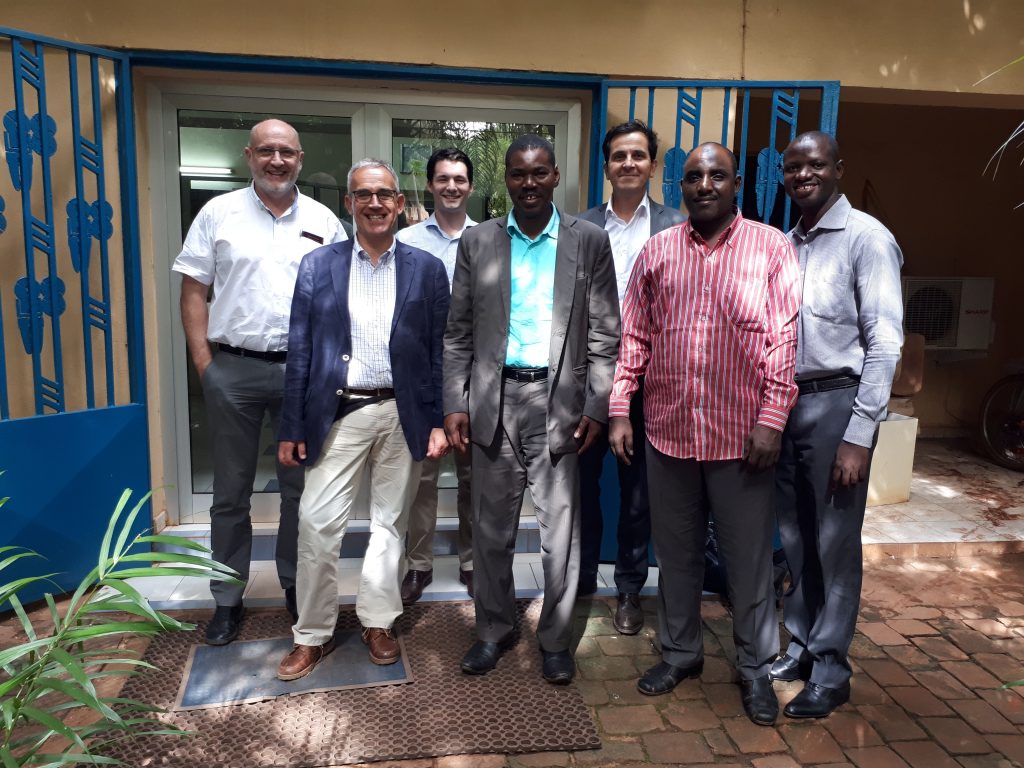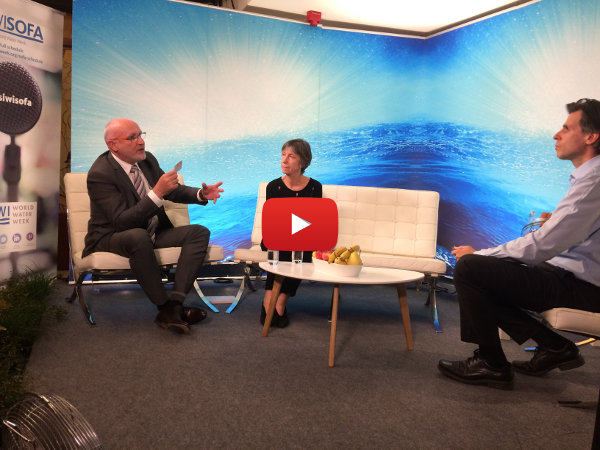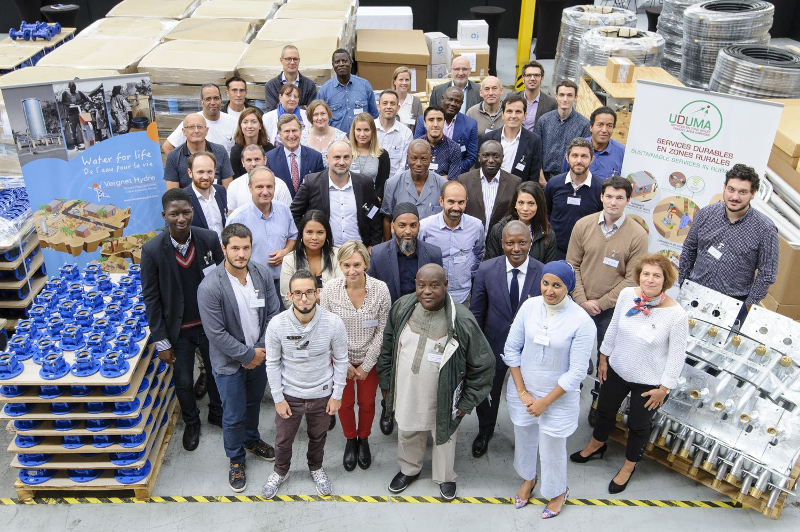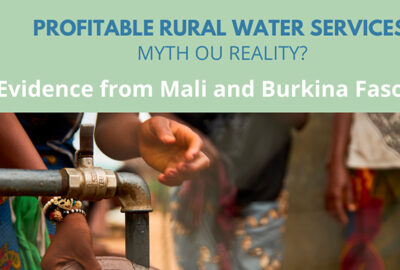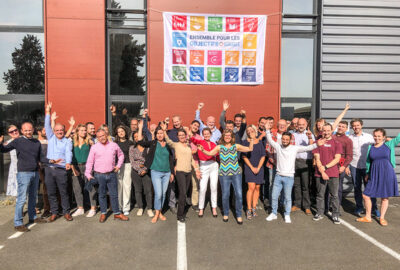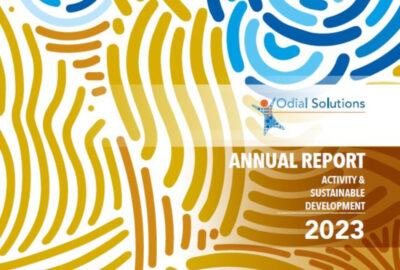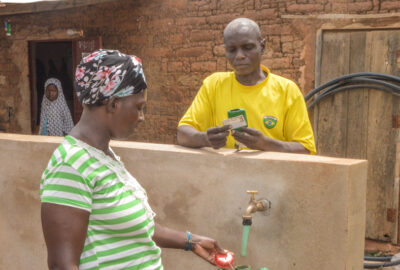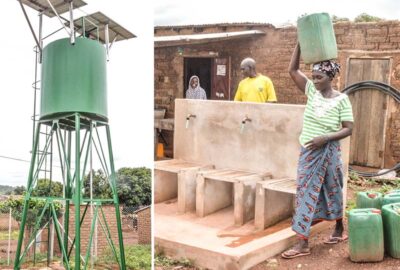News
To provide 560.000 people in rural Mali with drinking water for the next 15 years
The first private operator which undertakes to provide rural areas in Subsaharian Africa with drinking water on the basis of a long term commitment
Picture caption, from left to right: Thierry BARBOTTE (UDUMA), Arco VAN DER TOORN (AQUA FOR ALL), Nicolaas VAN DER WILK (UDUMA), Bourama TRAORE (BERE CONSULTING), Lionel CORMIER (DEMETER PARTNERS), Abdoul ABDOU (SNV-MALI) and Emmanuel DIARRA (AKVO-MALI).
“The young French company UDUMA, subsidiary of the ODIAL SOLUTIONS Group (Orléans, France), is the first private operator which undertakes to provide rural areas in Subsaharian Africa with drinking water on the basis of a long term commitment”, explains Thierry BARBOTTE, Managing Director of UDUMA, enthusiastically. Representatives of the Dutch NGOs AQUA FOR ALL, AKVO and SNV-MALI, of the National Hydraulic Agency in Mali (DNH MALI), and of UDUMA had their kick-off meeting in Bamako on Wednesday 20 September 2017, to officially start the Public Private Partnership which is to manage for the next 15 years the water supply for 560 000 people in the rural parts of SIKASSO region (Southern Mali).
UDUMA will deliver an original, innovative and sustainable water supply service. On behalf of the local authorities and communities, UDUMA will rehabilitate, operate and manage 1400 public manual pumps, which are often the only source of clean drinking water. UDUMA outfits the pumps with meters and data loggers. UDUMA guarantees a continuous water service with a 72-hour max downtime, at an affordable tariff. “In practice, in a village which chose to delegate its drinking water supply service to UDUMA, each inhabitant has an e-card which enables them to buy, from certified pump operators, quantities of water they need. These cards are reloaded in dedicated kiosks or online”, specifies Nicolaas VAN DER WILK, Operations Manager for UDUMA.
UDUMA injects 2-million private funds in this project
UDUMA, which is creating a local subsidiary UDUMA MALI, leads an innovative Public Private Partnership. It should be noted that the company injects 2-million private funds in a project whose budget amounts to 5 million euros. The remaining 3 million are provided through a subsidy from the Netherlands Ministry of Foreign Affairs, of which 1 million euros dedicated to public awareness raising, mapping and monitoring.
The involvement of the DNH and of the Regional Hydraulic Agency (DRH) of the SIKASSO region in the Public Private Partnership is crucial. The DNH brings its strategic vision, participates in the validation of the public service delegation agreements and facilitates coordination between the partners and the Malian Ministry of Energy and Water. The SIKASSO DRH, will help the consortium to identify the municipalities and water points. The inception phase of the project will serve to identify the municipalities and water points to be included in the project.
In the UDUMA model, each villager pays the water service according to their needs
The ambition of UDUMA is to ensure a sustainable drinking water supply to rural people in Africa. Right now, 50% of the water supply points in African remote areas are out of order or function improperly and 400 million rural people don’t have any access to drinking water. “In the UDUMA model, each villager pays the water service according to their needs. They contribute in this way to the maintenance of drinking water supply equipment in the long run”, sums up Thierry BARBOTTE.
Consequently, UDUMA participates, with help from the Malian and Dutch governments, in the achievement of the UNITED NATIONS Sustainable Development Goals, more specifically, Goals 6 (Ensure availability and sustainable management of water and sanitation for all), 9 (Build resilient infrastructure, promote inclusive and sustainable industrialization and foster innovation) and 17 (Strengthen the means of implementation and revitalize the global partnership for sustainable development).
Since 2016, UDUMA has set up a pilot site in Burkina Faso. This project, funded by an UNITED NATIONS agency, allows the young company to test the technical feasibility and the social acceptance of the e-pumps and of the electronic wallets.
Comments are closed



